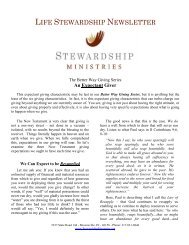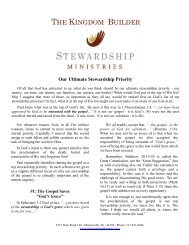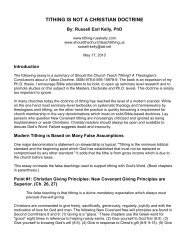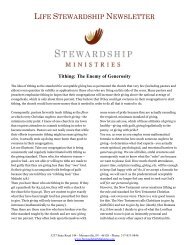âWill a Man Rob God?â (Malachi 3:8) - Biblical Foundations
âWill a Man Rob God?â (Malachi 3:8) - Biblical Foundations
âWill a Man Rob God?â (Malachi 3:8) - Biblical Foundations
Create successful ePaper yourself
Turn your PDF publications into a flip-book with our unique Google optimized e-Paper software.
6<br />
In Gen 28:22, Jacob promised to give <strong>God</strong> a tithe. In context, however, it appears that<br />
Jacob’s vow shows his lack of trust in <strong>God</strong>’s word. 29 Jacob stopped for the night on his way to<br />
Haran (Gen 28:10). While sleeping he had a dream, in which <strong>God</strong> promised six things (Gen<br />
28:13–15): (1) to give Jacob the land on which he had lain down to rest; (2) that his offspring<br />
would be great in number; (3) that his descendants would bless the families of the earth; (4) that<br />
<strong>God</strong> would stay with Jacob; (5) that <strong>God</strong> would keep Jacob safe in his journeys; and (6) that <strong>God</strong><br />
would bring him back to the land on which he had lain down to rest. In closing, <strong>God</strong> reassures<br />
Jacob that these things will happen and that he will not leave him.<br />
Jacob, however, responds in fear, erecting an altar and naming the place “Bethel.”<br />
Jacob’s vow is very revealing in that it is a conditional vow. “If” <strong>God</strong> does what he asks, “then”<br />
he will do the following. The “conditions” placed upon <strong>God</strong> in Gen 28:20–22 are as follows: (1)<br />
if <strong>God</strong> will stay with Jacob; (2) if <strong>God</strong> will keep him safe on his current journey; (3) if <strong>God</strong> will<br />
provide him with food and clothes; and (4) if he returns home. <strong>God</strong> had already promised to<br />
fulfill three of these four conditions, and the fulfillment of the fourth seems to be assumed. 30 The<br />
“then” part 31 of Jacob’s vow included: (1) Yahweh will be his <strong>God</strong>; (2) the pillar will be <strong>God</strong>’s<br />
house; and (3) he will give a tenth of all that <strong>God</strong> gives him.<br />
While narratives in the Old Testament can serve as examples of faith for all believers (see<br />
Heb 11), this is not one of those examples. Interpreters need to read these narratives critically;<br />
not every text presents the patriarchs or kings positively. 32 For example, it is commonly accepted<br />
that although David (and Solomon) had many wives, this was never approved by <strong>God</strong>. David’s<br />
marriages to multiple wives are therefore not to be construed as a positive example. A<br />
description of a historical account does not necessarily indicate that these actions are prescribed<br />
or even commendable. Similarly, the present account involving Jacob should not be read as<br />
suggesting that Christians ought to emulate Jacob’s behavior. 33 Rather, it teaches believers to<br />
avoid spiritual immaturity or unbelief. 34 Verse 22 could be construed as associating Jacob with a<br />
“bribe . . . to buy <strong>God</strong>’s blessing.” 35 Jacob also seems to have been a specialist in the area of<br />
29 Contra Walter Brueggemann, Genesis: A Bible Commentary for Teaching and Preaching (IBC; Atlanta: John<br />
Knox, 1982), 246, who believes Jacob is now trusting, repentant, and believing; he has put aside fear and guilt. But<br />
even Brueggeman recognizes the “if” clause in the present passage: “Jacob will be Jacob. Even in this solemn<br />
moment, he still sounds like a bargain-hunter. He still adds an ‘if’ (v. 20)” (ibid., 248).<br />
30 This is also noticed by Snoeberger, “The Pre-Mosaic Tithe,” 88–89.<br />
31 Contra Hamilton, The Book of Genesis: Chapters 18–50 (NICOT; Grand Rapids: Eerdmans, 1995), 248.<br />
32 See Gordon J. Wenham, Genesis 16–50 (WBC 2; Waco: Word, 1994), 223–25, who, along with most scholars,<br />
views Jacob as being portrayed positively. Contra Snoeberger, “The Pre-Mosaic Tithe,” 89.<br />
33 So MacArthur, <strong>God</strong>’s Plan for Giving, 74.<br />
34 John MacArthur, Jr., Whose Money is it Anyway? (Waco: Word, 2000), 103.<br />
35 Ibid., 103. Contra Ross, “Jacob’s Vision,” 233, who says: “Vows were not made to induce <strong>God</strong> to do something<br />
He was not willing to do. They were made to bind the worshiper to the performance of some acknowledged duty.








